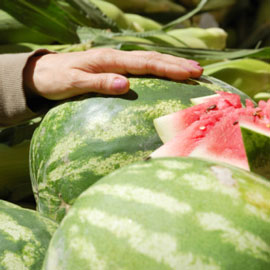 Why buying organic, Georgia-grown produce is good for your weight loss diet
Why buying organic, Georgia-grown produce is good for your weight loss diet
Summertime is nearly here, which means your favorite locally-grown summer foods are cropping up as well. Though modern supermarkets make it possible to find just about anything year-round, eating local is one great way to keep focused on a healthier lifestyle after surgery for weight loss. Here are a few reasons why buying local may be beneficial for your diet and community after LAP-BAND:
Fertilizers, pesticides, poisons.
Most small-scale local farming operations use organic farming techniques, growing food in a way that is harmonious with nature. This eliminates the need for synthetic fertilizers, most of which the Environmental Protection Agency (EPA) recognize as carcinogenic, and pesticides. Though the effects of pesticides on humans are not yet fully understood, farmers who experience higher levels of exposure often exhibit serious neurological symptoms like hand tremors, and recent studies have linked them to ADHD in kids. The bottom line: they’re poison.
Save energy and the environment.
Food travels an average of 1,500 miles before arriving at your dinner table. If we all ate just one locally-grown organic meal per week, we could theoretically reduce our country’s weekly consumption of oil by 1.1 million barrels. Additionally, synthetic fertilizers wash away from commercial farms, causing serious damage to waterways and aquatic habitats. Those same fertilizers, along with other farming practices that focus on high-yield production of a single crop, rob the soil of natural minerals and nutrients, making the plants and our meals ultimately less nutritious.
Support the community.
One hundred years ago nearly half of the US population farmed—a figure that has dropped to less than two percent today. By buying local, you’re supporting a time-tested, sustainable agricultural model that has become increasingly threatened by the rise of factory-style farming. Local and organic food may be a little more expensive, but we also pay hidden costs for conventional produce in the form of federal subsidies, environmental damage, the disposal of hazardous wastes and the testing and regulation of pesticides.
Ready to buy some deliciously-local organic produce? Try heading to the Macon State Farmer’s Market, which is open seven days a week from 6 a.m to 10 p.m. at 2055 Eisenhower Parkway to find in-season fruits and veggies like the ones below.
- Asparagus. Harvest season for Georgia asparagus typically ends in June, so now is the perfect time to pick some up. Asparagus is packed with vitamin K, which is important for bone health and proper blood clotting, as well as antioxidants that repair free radical cellular damage to reduce your risk of heart disease, diabetes and cancer. LAP-BAND patients should make sure their asparagus is cooked thoroughly and cut into small pieces before eating.
- Watermelon. These massive, nutrient-packed melons are harvested from June through September in Georgia, making them readily available until the early fall. Low in sugar (and calories), watermelon makes a refreshing summer snack and is full of vitamins A and C. Studies have shown that watermelon may also lower blood pressure and help prevent cardiovascular disease.
- Okra. Harvested from May to September, you can enjoy this Southern favorite all summer long. Full of dietary fiber to aid in digestion and various vitamins and nutrients like vitamin A, iron, calcium and vitamin C, okra is a valuable part of any Georgia diet—just resist the urge to fry it!

Leave a Reply